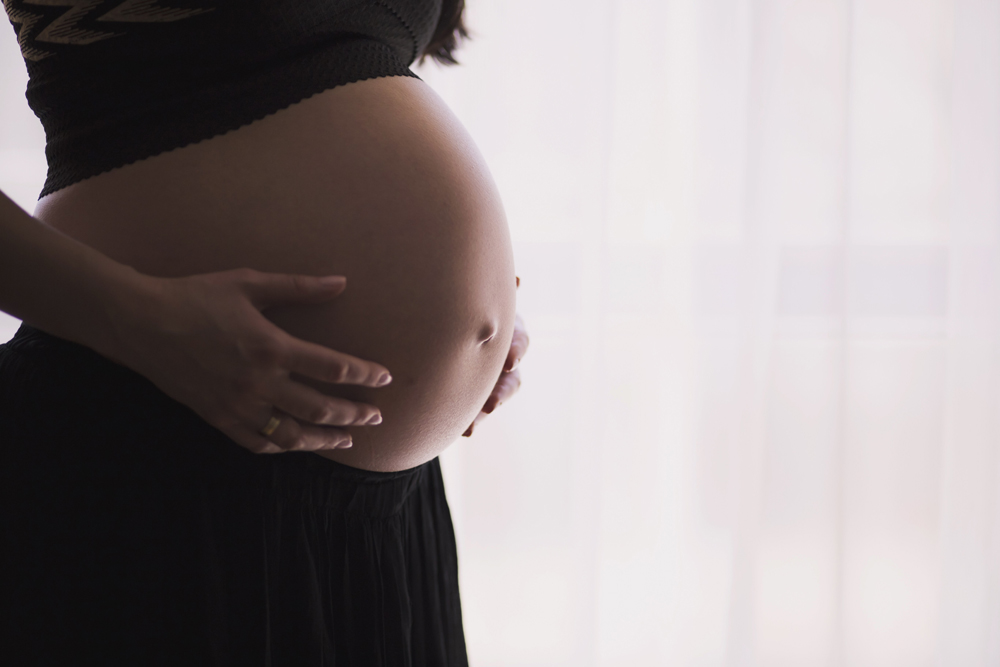A pregnant woman stands naked in front of a mirror. What does she see? What is she thinking? How does she feel about all of the changes happening?
Most will be in love with the growing life within them and love the bump that validates their thriving baby. Along with this new, deep love may come stretch marks, weight gain, acne, varicose veins, swelling, hemorrhoids, and more.
We are promised a glow that sometimes we only see when perspiring after a bought of morning sickness. So how is her body image and self-esteem affected as changes happen more dramatically and possibly differently than promised or from previous pregnancies? Who is the voice within her head, telling her how she appears to everyone else? Where does her definition of strength, beauty, ability, and resilience come from?
Even the most confident woman will probably be at odds with her body image at some point in her pregnancy. She may wonder how her figure will appear while rising to the challenge of pregnancy or she may fear permanent change. The pressures of society to be thin, may be exacerbated by the cookie cutter rule to not gain over 35 lbs (when at a healthy weight pre-pregnancy), may lead to her feeling pressure and confusion to uphold everyone else’s standards, despite her natural and primal ability to be healthy.
There is a lot of advice and judgment floating around (which women are used to), but pregnancy is a particularly vulnerable time. A BioMed Central study on body image during pregnancy concluded that “there is little doubt now that body image issues in obstetrics and gynecology impact negatively on women’s health and well-being.” It is also stated that “body dissatisfaction is often associated with negative psychological functioning, such as depression, and maladaptive behaviors, such as unhealthy eating and extreme weight loss behaviors.” A negative body image can sometimes be the core problem for pregnancy issues and mother-baby bonding after birth.
Now, despite being self-conscious, she waits for and watches her belly grow and her body change (probably not in the proportions or speed she had hoped), while receiving a barrage of comments from family, friends, and strangers: “Wow, you’re huge!” “You look like you’re ready to pop!” “You’re so small, are you eating enough?” “How big is the baby?” “Are you sure you aren’t having twins?” “Don’t worry, the baby weight will be easy to lose.”
It can be assumed that comments such as these are attempts to connect with a pregnant woman, out of societal obligation or a desire to acknowledge/celebrate her pregnancy, but it is usually inappropriate to walk up to someone and comment on their body. If we do choose to comment on someone’s appearance, don’t we usually compliment, uplift, try to brighten their day with how they have brought beauty into our lives? If you are caring and wanting to engage with her, try: “You are all belly!” “I couldn’t even tell you were pregnant from the back!” “You are radiant!” “You look so peaceful; you and your baby must have an amazing connection already!” “Pregnancy agrees with you, you are beautiful!” “You are glowing, like you could do this forever!”
Kind words are wonderful and the support she needs from time to time, but she cannot rely on comments alone to validate her body image. She needs to feel healthy, strong, and beautiful. Doctors are not addressing nutritional or body image issues with their patients, the public continues to call out pregnant women on their size and seemingly grill them on their ability to mother, so how does a woman find peace and strength amidst this chaos?
One simple answer is exercise. It may be the last thing she wants to do, it may not be something she has ever done consciously before, but it can make a huge difference. A simple walk or ten minute pregnancy exercise video off YouTube helps keep her physically and mentally well. According to Fit Pregnancy, exercise can regulate weight, make labor and delivery easier, lower rates of gestational diabetes by 27%, improve mood, decrease back pain, minimize constipation, increase energy, decrease chances of interventions during labor, reduce morning sickness, inhibit leg swelling, improve body image, and the list goes on! Here is an exercise video we can personally vouch for: What To Expect When You’re Expecting Workout.
Body positivity is the goal, whether it is something she is trying to maintain or obtain. Her healthcare provider (OBGYN, Certified Nurse Midwife, or Certified Professional Midwife) should be discussing how her nutritional needs are being met and how she feels about her growing body. Her worries, concerns, and fears should be voiced in order to overcome them. If she is not receiving nutritional or basic mental health care during her pregnancy, she may want to hire a doula or reach out to an organization like Nutrition Instincts, which will support body positivity and promote a healthy pregnancy, mother-baby bonding, and postpartum journey.
The key to success here is communication with someone who understands and will give her confidence in her beauty, strength, and ability to grow, birth, and sustain life. If she knows she is developing a negative body image and her self-esteem is taking a hit, she should not be relying on the comments of strangers and loved ones to reflect her worth. Hopefully she will exercise daily (for the “high” and sense of freedom) and reach out to a doctor, mental health professional, nutritionist, midwife, or doula. These simple steps can pave the path for a healthy pregnancy, postpartum period, and body positivity she can pass along to her child.
Want to talk more about body image? Reach out to us here at King of Prussia Doulas. We love to talk about the bump- and all that comes along with it.




Beautifully written and so true!